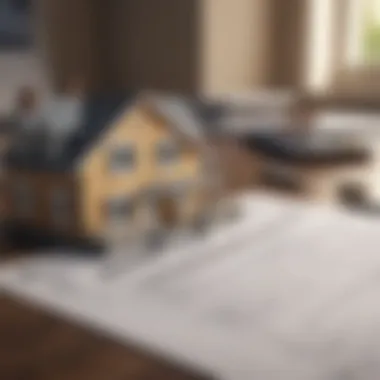Exploring the Benefits of Owning a Home Free and Clear


Intro
Owning a home free and clear is not just a dream for many, but a potential financial powerhouse. The freedom from mortgage payments can unlock countless opportunities, yet the implications of such ownership are multifaceted – more than just the absence of debt.
When you own your dwelling outright, the financial obligations decrease significantly. But while the house can feel like a golden goose, understanding the nuances of what it means to have that clear title is essential. So, what does this freedom really bring? How does it shape your financial landscape? The journey into the world of complete home ownership touches on areas like investments, credit scores, taxes, and estate planning.
Let’s venture into these aspects and explore what owning a home without a mortgage truly encompasses.
Investment Dictionaries
Key Financial Terms
Investing in real estate involves navigating a sea of terminology. Here are some key terms to familiarize yourself with:
- Equity: Represents the difference between the current market value of your home and the amount owed on it. In a fully owned home, this value is maximized.
- Appreciation: The increase in property value over time. Typically, owning a home can be a hedge against inflation as property values tend to rise.
- Cash Flow: The net amount of cash being transferred into and out of your property investments. A home free and clear can provide a positive cash flow if rented out.
Understanding Investment Jargon
Grasping the lingo can put you in a stronger position. Terms like 'investment property', 'capital gains', and 'return on investment (ROI)' can seem daunting at first, but gaining clarity helps you understand the implications of your decisions. One should know that property isn't just a place to live; it can be a substantial vehicle for wealth.
Financial Considerations
Financial Freedom
The first clear advantage is the financial liberation that comes with no mortgage. Every month, instead of paying toward interest, homeowners can allocate their funds to other investments or savings, fostering liquidity.
Tax Implications


Here's where the plot thickens. Owning a home free and clear entails specific tax considerations. Property taxes continue, but mortgage interest deductions are a thing of the past.
The good news?
Owning your home outright can potentially reduce your taxable income, giving a boost in certain situations.
Credit Scores and Home Equity
Although your mortgage has been paid off, your credit score won’t automatically skyrocket. Excellent credit management remains vital. Furthermore, a fully owned home adds to your equity portfolio, which can be leveraged for loans, if needed.
Estate Planning
In terms of legacy, a home free and clear can be a double-edged sword. Passing on property without encumberances can simplify estate planning, enabling heirs to fully grasp the value they're receiving. However, it’s crucial to consider how this impacts tax liabilities for inheritors.
Potential Investment Opportunities
With equity built solidly into your personal finances, the range of investment possibilities expands. In the realm of real estate, several strategies emerge, including:
- Rental Properties: Generating income becomes seamless. This gives you a hedge against inflation and provides a consistent income stream.
- Home Equity Line of Credit (HELOC): Without a mortgage, you could leverage the equity to secure a line of credit for other investments.
- Vacation Rentals: If you choose to diversify your property use, you might consider turning part of your space into a vacation rental, maximizing your returns.
In summary, owning a home outright can set the stage for financial opportunities and provide a strong foundation for advancing within the real estate market. The keys are understanding how to navigate the landscape effectively and being aware of the implications tied to such ownership.
By exploring these elements, we gather not just insight, but also the ability to harness the full potential of home ownership.
Prolusion to Homeownership Without Debt
Owning a home outright presents an opportunity that resonates deeply with many individuals in today’s financial landscape. It’s more than just having a roof over one’s head; it embodies a desire for freedom from financial burdens and the chance to build a secure foundation for the future. As home prices continue to rise and the complexities of mortgage lending grow, the idea of a debt-free home becomes particularly appealing.
When we speak about homeownership without debt, we refer to a scenario where there are no looming mortgage payments, no monthly interest to grapple with, and no anxiety about meeting bank obligations. Instead, a sense of pride and autonomy comes with the territory. Homeowners in this situation often experience a unique kind of financial clarity. This is not merely an issue of having a place to live; it touches on profound aspects of wealth accumulation, investment potential, and even personal well-being.


Key Elements of Homeownership Without Debt
- Financial Security: Owning a house free of mortgage means you’re not affected by fluctuations in interest rates or unexpected changes in your financial situation. This stability can be pivotal in times of economic uncertainty.
- Peace of Mind: For many, living without the pressure of monthly mortgage payments can lead to reduced stress. One's focus can shift from financial survival to enjoying life’s other priorities.
- Flexibility: Without mortgage constraints, homeowners can decide how to allocate their disposable income. They may choose to redirect funds into retirement savings, travel, or hobbies.
- Investment Opportunities: Homeowners can leverage their property as part of a broader investment strategy. Rather than being tethered to mortgage payments, they have the fluidity to invest or save the cash that would otherwise go to servicing debt.
In the bigger picture, this article aims to dissect the notion of owning a home free and clear, delving into its implications across various dimensions. Understanding how this ownership style touches upon financial benefits, equity management, credit considerations, and even estate planning will provide readers with a comprehensive view of this significant life choice.
Owning a home without debt is not merely a personal financial feat; it’s a strategic move that can influence one's overall lifestyle, risk management, and future aspirations. By exploring these dimensions, individuals and families can make informed choices about their financial future and housing decisions.
Defining Homeownership 'Free and Clear'
Owning a home free and clear is more than just a financial milestone; it signifies a level of independence and security many dream of. This section unpacks what it truly means to own property without the weight of a mortgage. More than just being debt-free, this state of ownership holds unique qualities and benefits that can shape one’s financial future.
Characteristics of Debt-Free Homes
A home owned outright comes with several defining characteristics that set it apart from traditional mortgage arrangements.
- No Monthly Payments: The most obvious feature is the absence of a monthly mortgage payment. This liberation allows for higher disposable income each month. Without that hefty sum going to a lender, homeowners can allocate funds toward savings, investments, or personal priorities.
- Full Equity Ownership: When one owns a home free and clear, they truly possess the asset in its entirety. This total ownership grants homeowners the flexibility to tap into their equity without owing anyone else, a platform for future financial maneuvers.
- Peace of Mind: There’s an undeniable emotional benefit to owning a home outright. Knowing that it is free and clear from any liens or claims can alleviate stress and worry. Homeowners can feel a deeper sense of belonging and stability, which adds to overall well-being.
- Increased Control: With total ownership comes more control over one’s property. Homeowners can make decisions regarding renovations, utilizes the space as they see fit, or even rent it out without having to consult a lender or worry about foreclosure.
- Potential for Investment Diversification: Homeownership without debt opens doors for homeowners to reinvest cash flow into other areas such as stocks or small businesses. With no mortgage obligations tying them down, the ability to freely maneuver capital becomes a reality.
Financial Benefits of Owning a House Outright
Owning a home outright, without any mortgage debt, brings an array of financial benefits that can significantly alter one’s economic landscape. This article delves into how the advantages of such a property can transform not just personal finances, but also influence larger investment strategies and future planning. The removal of mortgage payments can free up resources that can be channeled towards growth in other financial avenues.
Elimination of Monthly Mortgage Payments
When you own your house free and clear, the most notable advantage comes from the elimination of monthly mortgage payments. This means not only do you save the amount typically allocated for those payments, but you also gain substantial peace of mind. For many homeowners, these payments can be a hefty chunk of their monthly income. To illustrate, if a family pays $2,000 monthly towards their mortgage, over the course of a year, that amounts to $24,000—money that could instead enhance investments or savings.
The absence of these payouts can pave the way for increased financial freedom. Without the pressures of paying down a mortgage, homeowners often find themselves better equipped to manage other expenses. This newfound flexibility can allow for a more comfortable lifestyle, as individuals can allocate funds towards education, retirement savings, or even leisure activities without the looming weight of a mortgage.
Moreover, this stability can give homeowners a leg up in financial planning. It provides an opportunity to focus on long-term investments without the constant worry of meeting monthly payment obligations. It is akin to sailing on calm waters compared to navigating through a storm.


Increased Cash Flow for Investments
With no mortgage payments on their plate, homeowners can redirect cash flow towards various investment opportunities. This is where the potential for growth becomes particularly exciting. When funds aren’t tied up in a mortgage, homeowners might consider contributing to retirement accounts, investing in the stock market, or even nurturing small business ventures.
For instance, let's say a homeowner had planned to invest in a small startup. If they had a $1,500 mortgage payment and no longer face that financial commitment, they could funnel that amount directly into their entrepreneurial endeavor instead.
- Diversifying Investments: Some might opt to diversify their investments across various assets, from stocks to bonds, or even alternative investments like peer-to-peer lending. Investing wisely during this phase can lead to exponential growth over the years.
- Emergency Fund Enhancements: Many find solace in bolstering their emergency funds, ensuring they are prepared for unforeseen circumstances without having to worry about borrowing costs or high-interest credit.
- Exploring Passive Income Streams: The ability to invest in rental properties or real estate investment trusts (REITs) becomes feasible as well. This can create streams of passive income that further solidify financial stability.
"Owning a home outright is not just about eliminating debt; it’s about unlocking doors to new financial vistas that can pave the way for a prosperous future."
The financial benefits are extensive and can lead to a more secure and enriched life. However, it is crucial to approach these opportunities with cautious optimism, ensuring that the decisions made are well-informed and aligned with long-term goals.
Understanding Home Equity
Home equity is the portion of your home that you truly own. It's calculated by subtracting what you owe on your mortgage from the current market value of the property. Understanding home equity is vital for homeowners who have paid off their mortgage completely. Owning a home free and clear not only offers peace of mind but also opens a financial door that many may overlook. It’s something that can breathe life into your financial plans, giving you leverage as you navigate future investments or expenditures.
Being aware of how equity shifts in value based on market conditions is key. For instance, if your house is worth $400,000 and you’ve paid off your mortgage, your home equity stands at a full $400,000. This is not just a number; it’s your financial safety net. In case of emergencies, this equity can be tapped into, providing cash flow where you need it most.
Moreover, understanding this concept offers insight into planning for future investments. With this asset at your disposal, you’re less constrained and can make informed decisions about how to use that equity, be it through a line of credit or selling the property and investing elsewhere.
Calculating Home Equity
Calculating home equity might seem straightforward, but there are nuances that can affect the final figure. To get a clearer picture of how much equity you possess, follow this simple process:
- Determine the Current Market Value of Your Home
- Subtract Existing Liabilities
- This could involve hiring a professional appraiser or evaluating similar properties in your neighborhood.
- If you once had a mortgage and it’s fully paid off, the process is easy. If there are any home equity loans or lines of credit, subtract these amounts from your market value.
In formula terms, it looks like this:
Home Equity = Current Market Value of Home - Outstanding Liabilities















